Graduate Institute of International and Development Studies
The Graduate Institute of International and Development Studies, or the Graduate Institute (French: Institut de hautes études internationales et du développement, previously known as Institut des hautes études internationales), abbreviated IHEID (previously HEI, IHEI, or IUHEI), is a government-accredited postgraduate institution of higher education located in Geneva, Switzerland.[3][4]
- Not to be confused with the similarly-named Geneva School of Diplomacy and International Relations
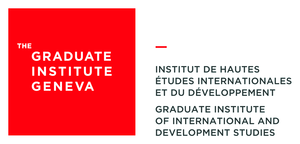 | |
Former names | The Graduate Institute of International Studies (1927–2007) |
|---|---|
| Type | Semi-private, semi-public graduate school |
| Established | 1927[1] |
| Director | Philippe Burrin |
Academic staff | 73 professors, 12 (senior) lecturers, 39 visiting[2] |
| Students | 951 (89% international)[2] |
| Location | , |
| Campus | Urban |
| Working languages | English and French |
| Nickname | The Graduate Institute, IHEID, HEI |
| Affiliations | Europaeum, APSIA, EUA, ECUR, EADI, AUF |
| Website | www |
The institution counts one UN secretary-general (Kofi Annan), seven Nobel Prize recipients, one Pulitzer Prize winner, and numerous ambassadors, foreign ministers, and heads of state among its alumni and faculty.[5] Founded by two senior League of Nations officials, the Graduate Institute maintains strong links with that international organisation's successor, the United Nations, and many alumni have gone on to work at UN agencies.
Founded in 1927, the Graduate Institute of International Studies (IHEI or HEI) is continental Europe's oldest school of international relations and was the world's first graduate institute dedicated solely to the study of international affairs.[6] It offered one of the first doctoral programmes in international relations in the world. In 2008, the Graduate Institute absorbed the Graduate Institute of Development Studies, a smaller postgraduate institution also based in Geneva founded in 1961. The merger resulted in the current Graduate Institute of International and Development Studies.[7]
Today the school enrols close to a thousand postgraduate students from over 100 countries. Foreign students make up nearly 90% of the student body and the school is officially a bilingual English-French institution, although the majority of classes are in English.[8] With Maison de la Paix acting as its primary seat of learning, the Institute's campuses are located blocks from the United Nations Office at Geneva, International Labour Organization, World Trade Organization, World Health Organization, International Committee of the Red Cross, World Intellectual Property Organization and many other international organisations.[9][10]
It runs joint degree programmes with universities such as Smith College and Yale University, and is Harvard Kennedy School's only partner institution to co-deliver double degrees.[11][12]
The school is a member of the Association of Professional Schools of International Affairs (APSIA), a group of schools that specialize in public policy, public administration, and international affairs.
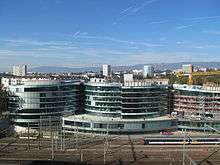
History
.jpg)
The Graduate Institute of International Studies was co-founded in 1927 by two scholar–diplomats working for the League of Nations Secretariat: the Swiss William Rappard, director of the Mandates Section, and the Frenchman Paul Mantoux, director of the Political Section.[13] A bilingual institution like the League, it was to train personnel for the nascent international organisation.[13] Its co-founder, Rappard, served as director from 1928 to 1955.[13]
.png)
The Institute's original mandate was based on a close working relationship with both the League of Nations and the International Labour Organization. It was agreed that in exchange for training staff and delegates, the Institute would receive intellectual resources and diplomatic expertise (guest lecturers, etc.) from the aforementioned organisations. According to its statutes, the Graduate Institute was "an institution intended to provide students of all nations the means of undertaking and pursuing international studies, most notably of a historic, judicial, economic, political and social nature."
The institute managed to attract a number of eminent faculty and lecturers, particularly from countries mired in oppressive Nazi regimes, e.g., Hans Wehberg and Georges Scelle for law, Maurice Bourquin for diplomatic history, and the rising young Swiss jurist, Paul Guggenheim. Indeed, it is said that William Rappard had observed, ironically, that the two men to whom the Institute owed its greatest debt were Mussolini and Hitler. Subsequently, more noted scholars would join the Institute's faculty. Hans Kelsen, the well-known theorist and philosopher of law, Guglielmo Ferrero, Italian historian, and Carl Burckhardt, scholar and diplomat all called the Graduate Institute home. Other arrivals, similarly seeking refuge from dictatorships, included the eminent free market economy historian, Ludwig von Mises, and another economist, Wilhelm Ropke, who greatly influenced German postwar liberal economic policy as well as the development of the theory of a social market system.[14]
After a number of years, the Institute had developed a system whereby cours temporaires were given by prominent intellectuals on a week, semester, or yearlong basis. These cours temporaires were the intellectual showcase of the Institute, attracting such names as Raymond Aron, René Cassin, Luigi Einaudi, John Kenneth Galbraith, G. P. Gooch, Gottfried Haberler, Friedrich von Hayek, Hersch Lauterpacht, Lord McNair, Gunnar Myrdal,[15] Harold Nicolson, Philip Noel Baker, Pierre Renouvin, Lionel Robbins, Jean de Salis, Count Carlo Sforza, Jacob Viner, and Martin Wight.
.jpg)
Another cours temporaire professor, Montagu Burton Professor of International Relations at Oxford University, Sir Alfred Zimmern, left a particularly lasting mark on the Institute. As early as 1924, while serving on the staff of the International Council for intellectual Cooperation in Paris, Zimmern began organizing international affairs summer schools under the auspices of the University of Geneva, 'Zimmern schools', as they became known. The initiative operated in parallel with the early planning for the launch of the Graduate Institute and the experience acquired by the former helped to shape the latter.[14]
Despite its small size, (before the 1980s the faculty never exceeded 25 members), the Institute boasts four faculty members who have received Nobel Prizes for economics – Gunnar Myrdal, Friedrich von Hayek, Maurice Allais, and Robert Mundell. Three alumni have been Nobel laureates.
For a period of almost thirty years (1927–1954) the school was funded predominantly through the support of the Rockefeller Foundation. Since then the canton of Geneva and the Swiss Federal Council bear most of the costs associated with the Institute. This transfer of financial responsibility coincided with the 1955 arrival of William Rappard's successor as director of the institute, Lausanne historian Jacques Freymond. Freymond inaugurated a period of great expansion, increasing the range of subjects taught and the number of both students and faculty, a process that continued well after his retirement in 1978. Under Freymond's tenure, the Graduate Institute hosted many international colloquia that discussed preconditions for east-west negotiations, relations with China and its rising influence in world affairs, European integration, techniques and results of politico-socioeconomic forecasting (the famous early Club of Rome reports, and the Futuribles project led by Bertrand de Jouvenel), the causes and possible antidotes to terrorism, Pugwash Conference concerns and much more. Freymond's term also saw many landmark publications, including the Treatise on international law by Professor Paul Guggenheim and the six-volume compilation of historical documents relating to the Communist International.[14]
The parallel history of the Graduate Institute of Development Studies (French: Institut universitaire d’études du développement, IUED) also involves Freymond, who founded the institution in 1961 as the Institut Africain de Genève, or African Institute of Geneva. The Graduate Institute of Development Studies was among the pioneer institutions in Europe to develop the scholarly field of sustainable development. The school was also known for the critical view of many of its professors on development aid, as well as for its journal, the Cahiers de l'IUED[16] It was at the center of a huge international network.
Recent merger
In 2008, the Graduate Institute of International Studies (HEI), absorbed the Graduate Institute of Development Studies (IUED), to create the current Graduate Institute of International and Development Studies (IHEID).
Academics
Admission to the Graduate Institute's study programmes is highly competitive, with only 14% of applicants attending the Graduate Institute in 2014.[17] The Institute awards its own degrees.[18] It does not award undergraduate degrees.
Ranking
As a small institution offering exclusively master's and PhD programmes, the institute does not participate in popular university ranking.[19]
In Foreign Policy's 2014[20] Inside the Ivory Tower ranking of best international relations schools in the world, the Graduate Institute's master's program was ranked 24th among Master's Programs for Policy Career in International Relations. It ranked 29th in 2018.[21] In 2012, The Graduate Institute was listed among the Foreign Policy Association's "Top 50 International Affairs Graduate Programs." [22]
The LL.M. in international dispute settlement, offered jointly with the University of Geneva, was ranked second worldwide according to a 2012 survey of law firms conducted by the Global Arbitration Review.[23] This same LL.M. also consistently featured in the top 10 LL.M. for alternative dispute resolution by the specialised website LLM-guide.[24][25]
The Graduate Institute's LL.M. in international law also featured in the top 10 LL.M. for public international law compiled by LLM-guide.[26]
The Geneva Academy's LL.M. in international humanitarian law and human rights—a joint programme between the Graduate Institute and the University of Geneva—also featured in LLM-guide's top 10 LL.M. programmes for human rights law.[27]
Degree programmes
Master of Arts in International Affairs (MIA)
The MIA is an intensive two-year interdisciplinary Master programme which begins with a rigorous foundation in quantitative and qualitative methods and in all the disciplines of the Institute. Courses follow in three thematic tracks: Trade & International Finance; Global Security; and Environment, Resources & Sustainability.[28]
Master of Arts in Development Studies (MDEV)
Disciplinary Master's degree (MA/MPhil equivalent)
An advanced disciplinary two-year master's programme is offered by each of the Graduate Institute's five academic departments: International Relations & Political Science, International History, International Law, International Economics, and Anthropology & Sociology. The programme includes a significant taught portion and students dedicate a full semester on their master's thesis under supervision during the programme. In addition, a number of students transition during the MPhil to PhD status by way of the Fast Track programme.[29]
Doctorate (PhD)
PhD students specialize in one disciplinary field. PhD candidates who wish to carry out bi-disciplinary research choose a main discipline (a major) and a second discipline (a minor).
Executive masters
Executive education programmes include masters in International Law, International Negotiation and Policy-Making, Development Policies and Practices, International Oil and Gas Leadership.
Partnerships
The Graduate Institute has established joint or dual degree programmes with: the MPA programme at Harvard University's John F. Kennedy School of Government; the LLM in Global Health Law programme at the Georgetown University's Law Center; the BA programme at Yale University's Jackson Institute for Global Affairs; the BA programme at Peking University; the BA programme at Smith College; the BA programme at the University of Hong Kong, and with the University of Geneva's LLM in International Dispute Settlement, LLM in International Humanitarian Law, Master's in Transational Justice, Master's of Advanced Studies in Humanitarian Action, Master's in Global Health, and Master's in Asian Studies.
Apart from the dual/joint degree programmes, students also have the option to spend an exchange semester at Georgetown Law School, Harvard Law School, Michigan Law School, UCLA School of Law, Boston University School of Law, Yale University, the Elliott School of International Affairs at George Washington University, the Fletcher School of Law and Diplomacy at Tufts University, School of International Service at American University in Washington D.C., Northwestern University, University of Toronto, Sciences Po Paris – Institut d'Études Politiques de Paris, the Hertie School of Governance in Berlin, Bocconi University in Italy, Libera Università Internazionale degli Studi Sociali Guido Carli in Italy, the Graduate School of International Studies at Seoul National University, the Lee Kuan Yew School of Public Policy at the National University of Singapore, the Graduate School of Asia-Pacific Studies at Waseda University, University of Hong Kong, Tsinghua University, Fudan University, Peking University, KIMEP University, Gadjah Mada University, the School of International Studies at Jawaharlal Nehru University, University of Malaya, the American University in Cairo, Boğaziçi University in Turkey, Pontifical Catholic University of Rio de Janeiro, Pontifical Catholic University of Peru, El Colegio de México, the University of Ghana, Cheikh Anta Diop University, Stellenbosch University, as well as the University of St. Gallen and ETH Zürich in Switzerland.
Furthermore, the Graduate Institute is an active member of the following associations and academic networks:
- APSIA – Association of Professional Schools of International Affairs: academic institutions specialising in international relations and international public policy are represented among APSIA’s thirty-odd members.
- European University Association: Represents and supports more than 850 institutions of higher education in 46 countries, providing them with a forum for cooperation and exchange of information on higher education and research policies.
- Europaeum: Created at the initiative of the University of Oxford, the Europaeum is composed of ten leading European institutions of higher education and research.
- European Consortium for Political Research: The ECPR is an independent scholarly association that supports the training, research and cross-national cooperation of many thousands of academics and graduate students specialising in political science and all its sub-disciplines.
- European Association of Development Research and Training Institutes: The EADI is the largest existing network of research and training institutes active in the field of development studies.
- Agence Universitaire de la Francophonie: The AUF supports the build-up a French-language research area between French-speaking universities. The Institute is one of 536 members belonging to the AUF and takes part in its exchange programmes in the fields of teaching and research.
- Swiss University Conference: The SUC is a governmental organisation tasked with accrediting officially recognized Swiss universities.
Campus
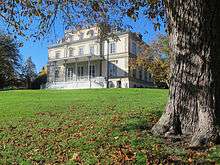
The Campus de la paix is a network of buildings extending from Place des Nations (the United Nations Headquarters in Geneva) to the shores of Lake Geneva, spanning two public parks – Parc Barton and Parc Moynier.
Maison de la paix
The Graduate Institute's main campus is the Maison de la paix ("House of Peace"), which opened in 2013.[30] The Maison de la Paix is a 38,000 meter-square glass building distributed into six connected sections. It contains the Davis Library, which holds 350,000 books about social sciences, journals and annual publications, making it one of Europe's richest libraries in the fields of development and international relations. It is named after two Institute alumni—Ambassador Shelby Cullom Davis and his wife Kathryn Davis, following the Davis' $10 million donation to the Institute.[31] The neighboring Picciotto Student Residence was completed in 2012 and provides 135 apartments for students and visiting professors.
In addition to serving as the Institute's main campus, the Maison de la paix also houses policy centres and advocacy groups with close ties to the Institute such as the Geneva Centre for the Democratic Control of Armed Forces (DCAF), the Geneva Centre for Security Policy (GCSP) the Geneva International Centre for Humanitarian Demining, Interpeace, the International Institute of Humanitarian Law and the World Business Council for Sustainable Development.[30]
Historic villas
Another section of the campus are two historic villas situated by Lake Geneva, Villa Barton and Villa Moynier. Villa Barton served as the Institute's main campus for most of the school's history. It now mostly houses administrative staff. Villa Moynier, created in 2001 and which opened in October 2009, houses the Institute-based Geneva Academy of International Humanitarian Law and Human Rights. The building holds a symbolic significance as it was originally owned by Gustave Moynier, co-founder of the International Committee of the Red Cross, and subsequently used by the League of Nations and as the headquarters of the ICRC between 1933 and 1946.
Campus expansion
Expansion projects include the construction of the Portail des Nations (or Gate of Nations) near the Palace of Nations. The new building will house a series of conference rooms for students and host exhibitions on the role of Geneva in world affairs.[32] The school has also partnered with the University of Geneva to open a center for international cooperation at the historic Castle of Penthes.[33] And in 2017, the school announced it had retained the services of Japanese architect Kengo Kuma to build a 700-bed student housing building. [34]
Research
The Institute's research activities are conducted both at fundamental and applied levels with the objective of bringing analysis to international actors, private or public, of main contemporary issues. These research activities are conducted by the faculty of the Institute, as part of their individual work, or by interdisciplinary teams within centres and programmes whose activity focus on these main fields:
- Conflict, security, and peacebuilding
- Development policies and practices
- Culture, religion, and identity
- Environment and natural resources
- Finance and Development
- Gender
- Globalisation
- Governance
- Migration and refugees
- Non-state actors and civil society
- Rural development
- Trade, regionalism, and integration
- Dispute settlement
- Humanitarian action
Furthermore, IHEID is home to the Swiss Chair of Human Rights, the Curt Gasteyger Chair in International Security and Conflict Studies, the André Hoffmann Chair in Environmental Economics, the Pictet Chair in Environmental International Law, the Pictet Chair in Finance and Development, the Yves Oltramare Chair on Politics and Religion, the Swiss Chair of International Humanitarian Law, and the Pierre du Bois Chair Europe and the World.
Programmes and research centres
The centres and programmes of the Institute distribute analysis and research that contributes to the analysis of international organisations headquartered in Geneva:
- The Centre on Conflict, Development and Peacebuilding is for research in the areas of conflict analysis, peacebuilding, and the complex relationships between security and development.
- The Centre for International Environmental Studies was established in 2010 for the purpose of developing political, legal and economic discourse on problems related to the global environment.
- The Centre for Trade and Economic Integration brings together the research activities of eminent professors of economics, law and political science in the area of trade, economic integration and globalization. The Centre provides a forum for discussion and dialogue between the global research community, including the Institute's student body and research centres in the developing world, and the international business community, as well as international organisations and NGOs.
- The Centre for Finance and Development's research deals with finance and development at three levels: international finance, and development finance in particular, including the role played by the international financial institutions such as the IMF and the World Bank; financial development, including banking and financial sector development in emerging and developing countries, both from contemporary and historical perspectives; microeconomics of finance and development.
- The Global Governance Centre provides a forum for scholars of governance and international organisations to interact with practitioners from the policy world in order to analyse global governance arrangements across a variety of issues.
- The Global Health Programme's activities focus on two pillars, namely global health governance and global health diplomacy.
- The Global Migration Centre focus on the transnational dimensions of migration and its interdisciplinary orientation. It combines inputs from lawyers, political scientists, economists, historians, anthropologists and sociologists.
- The Albert Hirschman Centre on Democracy.
- The Programme on Gender and Global Change produces research on the workings of gender in development and international relations and serves as a channel for the dissemination of such knowledge in both the anglophone and the francophone worlds.
- The Small Arms Survey is an independent research project that serves as the principal international source of public information on all aspects of small arms and armed violence and as a resource for governments, policy-makers, researchers, and activists.
Publications
- Refugee Survey Quarterly – Published by Oxford University Press and based at the Graduate Institute, the Refugee Survey Quarterly is a peer-reviewed journal focusing on the challenges of forced migration from multidisciplinary and policy-oriented perspectives.
- Journal of International Dispute Settlement – Established by the Graduate Institute and the University of Geneva in 2010, the JIDS is dedicated to international law with commercial, economic and financial implications. It is published by Oxford University Press.
- International Development Policy – A peer-reviewed e-journal that promotes cutting-edge research and policy debates on global development.
- European Journal of Development Research – The European Journal of Development Research is a co-publication of the Graduate Institute and the European Association of Development Research and Training Institutes with a multi-disciplinary focus.
- Medicine Anthropology Theory – Medicine Anthropology Theory is an open-access journal that publishes scholarly articles, essays, reviews, and reports related to medical anthropology and science and technology studies.
- Relations Internationales – Relations Internationales publishes research on international relations history ranging from the end of the 19th century to recent history.
Organisation
Legal status
_by_Erling_Mandelmann.jpg)
IHEID is constituted as a Swiss private law foundation, Fondation pour les hautes études internationales et du développement, sharing a convention with the University of Geneva.[35] This is a particular organisational form, because IHEID is constituted as a foundation of private law fulfilling a public purpose. In addition, the political responsibility for the Institute shared between the Swiss Confederation and the canton of Geneva. Usually in Switzerland, it is the responsibility of the cantons to run public universities, except for the Federal Institutes of Technology (ETHZ and EPFL). IHEID is therefore something like a hybrid institution, in-between the two standard categories.[36]
Foundation Board
The Foundation Board is the administrative body of the Institute. It assembles academics, politicians, people of public life and practitioners. It includes among others: Carlos Lopes, currently UN under secretary general and executive secretary of the Economic Commission for Africa, Julia Marton-Lefèvre (former director general of the International Union for Conservation of Nature), Joëlle Kuntz (journalist), and Tamar Manuelyan Atinc, (a former World Bank vice president).[7]
Administration
The Institute is headed by Philippe Burrin and his deputy Elisabeth Prügl.
Notable alumni
The Graduate Institute has more than 18,000 alumni working around the world.
- Kofi Annan – former secretary-general of the United Nations and 2001 Nobel Peace Prize recipient
- Mohamed ElBaradei – Egyptian jurist and diplomat, former director general of the International Atomic Energy Agency and 2005 Nobel Peace Prize recipient
- Leonid Hurwicz – Polish-American economist and mathematician, Nobel Memorial Prize in Economics in 2007
- Micheline Calmy-Rey – former president of the Swiss Confederation
- Kurt Furgler – former president of the Swiss Confederation
- Michel Kafando – interim president of Burkina Faso
- Alpha Oumar Konaré – ex-president of Mali
- Henri, Grand Duke of Luxembourg
- Jakaya Mrisho Kikwete – fourth president of Tanzania
Gallery
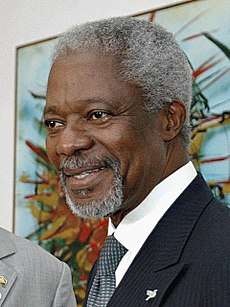 Kofi Annan, former UN secretary-general, 1997–2006 and Nobel Peace prize recipient
Kofi Annan, former UN secretary-general, 1997–2006 and Nobel Peace prize recipient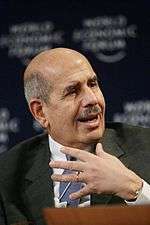 Mohamed ElBaradei, IAEA director-general, 1997–2009, former vice-president of Egypt and Nobel Peace Prize recipient
Mohamed ElBaradei, IAEA director-general, 1997–2009, former vice-president of Egypt and Nobel Peace Prize recipient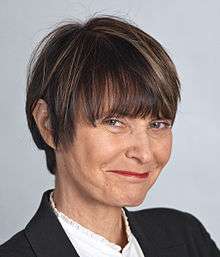 Micheline Calmy-Rey, former Swiss foreign minister and president of the Swiss Federal Council, 2007 and 2011
Micheline Calmy-Rey, former Swiss foreign minister and president of the Swiss Federal Council, 2007 and 2011 Philipp Hildebrand, head of the Swiss National Bank, 2010–2012, currently vice-chairman of BlackRock
Philipp Hildebrand, head of the Swiss National Bank, 2010–2012, currently vice-chairman of BlackRock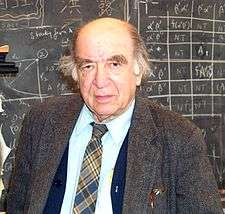 Leonid Hurwicz, Nobel Memorial Prize in Economic Sciences co-recipient
Leonid Hurwicz, Nobel Memorial Prize in Economic Sciences co-recipient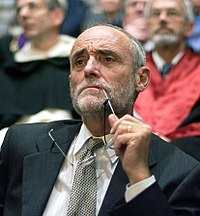 Jakob Kellenberger, president of the ICRC (2000–2012), and current professor at the institute
Jakob Kellenberger, president of the ICRC (2000–2012), and current professor at the institute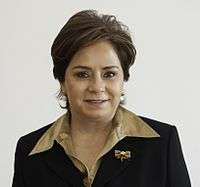 Patricia Espinosa, Mexican secretary of foreign affairs, 2006–2012, diplomat and executive secretary of the UNFCCC, 2016–present
Patricia Espinosa, Mexican secretary of foreign affairs, 2006–2012, diplomat and executive secretary of the UNFCCC, 2016–present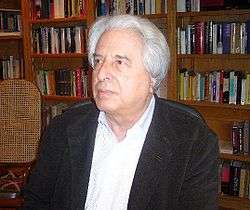 Saul Friedländer, Israeli historian and Pulitzer Prize winner
Saul Friedländer, Israeli historian and Pulitzer Prize winner Henri, Grand Duke of Luxembourg, 2000–present
Henri, Grand Duke of Luxembourg, 2000–present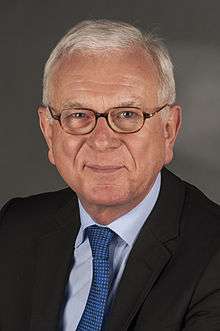 Hans-Gert Pöttering, president of the European Parliament, 2007–2009
Hans-Gert Pöttering, president of the European Parliament, 2007–2009.jpg) Jakaya Kikwete, the fourth president of Tanzania(2005-2015) and the Minister of Foreign Affairs (1995-2005) of Tanzania
Jakaya Kikwete, the fourth president of Tanzania(2005-2015) and the Minister of Foreign Affairs (1995-2005) of Tanzania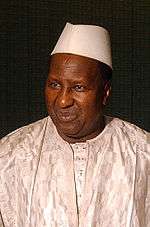 Alpha Oumar Konaré, the president of Mali (1992 to 2002), and chairperson of the African Union Commission (2003 to 2008)
Alpha Oumar Konaré, the president of Mali (1992 to 2002), and chairperson of the African Union Commission (2003 to 2008)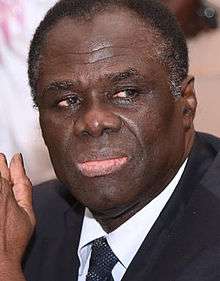 Michel Kafando, the president of Burkina Faso (2014 to 2015),[37] and minister of foreign affairs (1982 to 1983), the permanent representative of Burkina Faso to the United Nations (1998 to 2011)[38]
Michel Kafando, the president of Burkina Faso (2014 to 2015),[37] and minister of foreign affairs (1982 to 1983), the permanent representative of Burkina Faso to the United Nations (1998 to 2011)[38]
Nobel laureates
- Kofi Annan (DEA 1962), former secretary-general of the United Nations and 2001 Nobel Peace Prize winner[39]
- Mohamed ElBaradei (DEA 1964), Egyptian jurist and diplomat, former director general of the International Atomic Energy Agency, 1997–2009, and 2005 Nobel Peace Prize winner
- Leonid Hurwicz (1940), Polish-American economist and mathematician, 2007 winner of the Nobel Memorial Prize in Economics[40]
Business
- Ralph D. Crosby Jr. (DEA 1976), chairman and CEO of Airbus Group, Inc. (formerly EADS North America), 2002–2009[41]
- Jean-Marc Duvoisin (DEA 1985), CEO of Nespresso[42]
- Nobuyuki Idei, founder and CEO of Quantum Leaps Corporation; chairman and group CEO of Sony Corporation, 1999–2005[40]
- Daniel Jaeggi, co-founder of Mercuria Energy Group[43]
- Martin Kupka, chief economist of Československá obchodní banka.
- Rick Gilmore (PhD 1971), president and CEO of the GIC Group and Council on Foreign Relations scholar
- Philipp Hildebrand (DEA 1990), vice-president of BlackRock, former president of the Swiss National Bank[43]
- Baron Léon Lambert, Belgian banker and art collector,[43] whose bank was merged into the powerhouse Drexel Burnham Lambert
- Lynn Forester de Rothschild (fellow 1978–1979), CEO of E.L. Rothschild
- Yan Lan (PhD 1993), managing director of Lazard China[43]
- Frank Melloul (licence 1999), CEO of i24news
- Christopher Murphy-Ives (DES 1990), vice-president and deputy general counsel for Europe, Middle East and Africa, Latin America and Canada at Hewlett-Packard[43]
- Muriel Schwab, Chief financial officer of the Gunvor (company) Group.
- Brad Smith (DEA 1984), president and chief legal officer, Microsoft[44]
- Rafael Tiago Juk Benke, global head of corporate affairs of Brazilian multinational Vale
- G. Richard Thoman, American businessman and former president and CEO of Xerox Corporation[45]
- Bernard Zen-Ruffinen, president of Europe, Middle East and Africa at Korn Ferry International[43]
- Carl Zimmerer, founder and CEO of InterFinanz[43]
Diplomacy
- Marcia Donner Abreu (DEA), ambassador of Brazil, Secretary for Bilateral Negotiations in Asia, the Pacific and Russia
- Rubén González Sosa (DEA), ambassador, under-secretary of foreign affairs, 1971–1976, and acting foreign minister of Mexico, 1970–1975[46]
- Walid Abdel Nasser, ambassador of Egypt to the United Nations Office in Geneva
- Imran N. Hosein, Islamic scholar-specialist in Islamic Eschatology; foreign service officer in the Ministry of Foreign Affairs of the Government of Trinidad and Tobago
- Ochieng’ Adala, Ambassador of Kenya, executive director of the Africa Peace Forum
- Félix Baumann (DEA 1995), ambassador of Switzerland to the United Nations in Geneva
- William M. Bellamy (Certificate), Ret. US ambassador
- Térence Billeter (DEA), ambassador of Switzerland to China
- Jean-Marc Boulgaris (1970), former Swiss ambassador to Colombia and Denmark
- Linus von Castelmur (1992), ambassador of Switzerland to India
- Shelby Cullom Davis (PhD 1934), US ambassador to Switzerland, 1969–1975; philanthropist[47]
- Elyes Ghariani, Tunisian ambassador to Germany
- Erwin Hofer (1976), Swiss ambassador to Russia
- María Teresa Infante (PhD 1980), Chilean ambassador to the Netherlands
- Claude Heller (DEA), ambassador of Mexico to the United Nations
- Tamara Kunanayakam (DEA 1982), ambassador of Sri Lanka to the United Nations Office in Geneva; chairperson-rapporteur of the United Nations Open-ended Intergovernmental Working Group on the Right to Development, Human Rights Council
- A.H.M. Moniruzzaman (certificate '89), ambassador of Bangladesh to Belgium, Switzerland, and Luxembourg
- Robert G. Neumann (1937), American ambassador and politician
- François Nordmann (DEA 1972), Swiss ambassador to France
- Assad Omer, ambassador of Afghanistan to France
- Marcial Perez Chiriboga (PhD 1965), former ambassador of Venezuela to the US
- Michael Reiterer (1985), ambassador of the European Commission to Switzerland
- Oswaldo de Rivero, permanent representative of Peru to the United Nations in New York
- Jean-Daniel Ruch, ambassador of Switzerland to Israel
- Zalman Shoval (DEA 1952), former Israeli ambassador to the US
- Luis Solari Tudela, ambassador of Peru to the United Kingdom
- Mohamed Ibrahim Shaker (PhD 1975), Egyptian ambassador
- Jeno Stahelin, first Swiss Permanent Representative to the United Nations in New York
- Tuomas Tapio (PhD 2003), Ambassador of Finland to the OECD
- Nikolaos Vamvounakis (Diploma 1975), Greek ambassador in Bangkok and non-resident ambassador to Singapore, Cambodia, Laos and Myanmar
- Christian Wenaweser, ambassador of Liechtenstein to the United Nations
Law, politics and government
Heads of state
- Micheline Calmy-Rey (Licence 1968), former president of the Swiss Confederation[40]
- Kurt Furgler (1948), former president of the Swiss Confederation and member of the Swiss Federal Council
- Michel Kafando (1972), interim president of Burkina Faso, 2014–2015
- Alpha Oumar Konaré, former president of Mali, 1992–2002; chairperson of the African Union Commission, 2003–2008
- Henri, Grand Duke of Luxembourg (1980)[48]
Cabinet ministers
- Delia Albert, former secretary of foreign affairs of the Philippines
- Lourdes Aranda Bezaury, Undersecretary of Foreign Affairs of Mexico
- Youssouf Bakayoko (Certificate 1971), Foreign Minister of Côte d'Ivoire and ambassador[43]
- Davit Bakradze (1998), chairman of the Georgian Parliament and former foreign affairs minister
- Sibusiso Bengu (PhD 1974), former minister of education of South Africa; first black vice-chancellor of a South African university (Fort Hare University)[40]
- István Bibó (PhD 1935), former minister of state of Hungary
- Martin Coiteux (PhD), minister responsible for Government Administration of Quebec; chair of the Treasury Board of Quebec
- Joseph Cuthbert, Minister of Education, Culture, External Affairs of Trinidad and Tobago, 1971–1986
- Patricia Espinosa (DEA 1987), Secretary of Foreign Affairs of Mexico[40]
- Abul Fateh (Fellow 1962–1963), first Foreign Minister of Bangladesh
- He Yafei (DEA 1987), Assistant Foreign Minister of China
- Manouchehr Ganji (PhD 1960), Iranian human rights activist and former education minister
- Bonaya Godana (PhD 1982), Foreign Minister of Kenya, 1998–2001
- Parker T. Hart (Certificate 1936), former U.S. Assistant Secretary of State for Near Eastern and South Asian Affairs
- Jafar Hassan (PhD 2000), Jordanian Minister of Planning and International Cooperation, 2009–2013
- Annemarie Huber-Hotz (1975), former federal chancellor of Switzerland, 2000–2007
- Sandra Kalniete (1995), Minister of Foreign Affairs of Latvia, 2002–2004, current Member of the European Parliament
- Patti Londono Jaramillo, deputy foreign minister of Colombia, vice-minister of multilateral affairs, 2010–2013[43]
- Paul Martin Sr., former foreign minister of Canada, 1963–1968
- Yōichi Masuzoe, former governor of Tokyo, former Japanese Minister of Health, Labor and Welfare, 2007–2009, former member of the Japanese House of Councillors[43]
- Omer Tshiunza Mbiye (DEA 1967), former minister of economy of the Democratic Republic of the Congo
- Robert McFarlane (Licence), United States National Security Advisor, 1983–1985
- Teodor Meleșcanu (PhD 1973), Minister of Foreign Affairs of Romania, former director of the Foreign Intelligence Service and former minister of defense
- Ram Niwas Mirdha, former cabinet minister in India
- Kamel Morjane (DEA 1976), minister of public service of Tunisia, former defence minister and foreign minister
- Saïd Ben Mustapha, former foreign minister of Tunisia, 1997–1999
- Kristiina Ojuland (1992), former foreign minister of Estonia and current Member of the European Parliament
- Andrzej Olechowski, former minister of finance and minister of foreign affairs of Poland
- Marco Piccinini, former minister of finance and economy of Monaco
- Francisco Rivadeneira (1995), Minister of Foreign Trade and Economic Integration of Ecuador
- Haroldo Rodas (DEA), former foreign minister of Guatemala[43]
- Shri Shumsher K. Sheriff, secretary-general of the upper house of the Parliament of India
- André Simonazzi (Licence 1992), vice-chancellor of the Swiss Federal Council
- Djacoba Liva Tehindrazanarivelo (DEA 95, PhD 03), foreign minister of Madagascar
- Albert Tévoédjrè, former minister of information of Benin
- Tôn Thất Thiện (PhD 1963), former cabinet minister and public intellectual in Vietnam
- Omar Touray (DEA 1992, PhD 1995), former secretary of foreign affairs of the Gambia[43]
- Joseph Tsang Mang Kin, former minister of arts and culture of Mauritius; poet
- Henry Tumukunde (MA), former minister of national security in the cabinet of Uganda.
Judges
- Ann Aldrich, United States federal judge
- Marc Bossuyt (PhD 1975), member of the Permanent Court of Arbitration
- Giorgio Malinverni (PhD 1974), judge at the European Court of Human Rights
- Fatsah Ouguergouz (PhD 1991), judge at the African Court on Human and Peoples' Rights
- Christos Rozakis (visiting scholar 1985–1986), first vice-president of the European Court of Human Rights
- Max Sørensen (PhD 1946), former judge at the European Court of Justice, 1973–1979, and the European Court of Human Rights, 1980–1981
- Nina Vajić (DEA), judge at the European Court of Human Rights
- Abdulqawi Yusuf (PhD 1980), president of the International Court of Justice[43]
Members of Parliament
- Rep. Michael D. Barnes (DEA 1966), US Congressman, 1979–1987
- Tarcísio Burity, former governor of Paraíba, Brazil
- Jacques-Simon Eggly, Swiss Member of Parliament
- Mauricio Mulder (DEA 1985), member of Peruvian Congress
- Jacques Myard (PhD), member of the National Assembly of France
- Hans-Gert Pöttering (PhD), former president of the European Parliament, 2007–2009[49]
- Meta Ramsay, Baroness Ramsay of Cartvale, former British intelligence officer and member of House of Lords[50]
- Emrys Roberts, president of the British Liberal Party, 1963–1964[51]
- Henri Schmitt, Swiss Member of Parliament and Member of the European Parliament
- Alexandra Thein, German politician and Member of the European Parliament
Public officials
- Luis Marco Aguiriano Nalda (Licence), Secretary of State for the European Union
- Shara L. Aranoff (Fulbright 1984–1985), chairman of the U.S. International Trade Commission[40]
- Tennent H. Bagley (PhD 1950), Deputy Chief of the CIA's Soviet Bloc Division during the 1960s; author
- Signe Krogstrup (PhD), assistant governor and head of economics and monetary policy at Danmarks Nationalbank.
- Andréa Maechler (DEA 1994), Swiss National Bank's first female board member; Deputy Division Chief in the International Monetary Fund's Monetary and Capital Markets Department
- Jean-Pierre Roth (PhD 1975), former chairman of the Swiss National Bank[43]
- Robert-Jan Smits, director-general for research at the European Commission[40]
- Marcelo Zabalaga (1977), president of the Central Bank of Bolivia
United Nations and international organisations
- Arnauld Antoine Akodjènou (PhD '88), head of the United Nations Multidimensional Integrated Stabilization Mission in Mali (MINUSMA)
- Catarina de Albuquerque (MA), UN Special Rapporteur on the human right to safe drinking water and sanitation
- Hédi Annabi, former special representative of the United Nations Secretary-General for Haiti
- Anthony Banbury (DEA 1993), United Nations assistant secretary-general for field support, deputy ebola coordinator and operation crisis manager[43]
- Marcel André Boisard (PhD), under-secretary general to the United Nations and former executive director of United Nations Institute for Training and Research
- Arthur E. Dewey, former assistant UN secretary-general[43]
- Angèle Dikongué-Atangana, Deputy Director for Africa Bureau of the United Nations High Commissioner for Refugees
- Arthur Dunkel, director-general of General Agreement on Tariffs and Trade (GATT), 1980–1993[43]
- Rafael Grossi, director-general of the International Atomic Energy Agency
- Kamil Idris (PhD 1964), director-general of the World Intellectual Property Organization (WIPO), 1997–2008[43]
- C. Wilfred Jenks, director-general of the International Labour Organization, 1970–1973
- Jakob Kellenberger (1974–1975), president of the ICRC, 2000–2012[40]
- Pierre Krähenbühl, commissioner-general of the United Nations Relief and Works Agency for Palestine Refugees in the Near East (UNRWA)
- Olivier Long (PhD 1943), director-general of the General Agreement on Tariffs and Trade, 1968–1980[43]
- Carlos Lopes (DEA), UN under secretary-general and executive secretary of the Economic Commission for Africa[40]
- Jonathan Lucas (PhD 1998), head of the International Narcotics Control Board
- Jacques Moreillon (PhD 1971), former director-general of the ICRC
- Cornelio Sommaruga (PED 1961), former president of the ICRC from 1987 to 1999.
- Eric Suy, UN under secretary-general for legal affairs and director-general of the European Office of the United Nations in Geneva[43]
- Mervat Tallawy, Egyptian politician, former UN under-secretary and executive secretary of ESCWA
- Laura Thompson Chacón (DEA), deputy director-general of the International Organization for Migration and Costa Rican Ambassador
- Sérgio Vieira de Mello, former United Nations High Commissioner for Human Rights
- René-Jean Wilhelm (PhD 1983), co-author of the Geneva Conventions
- Ralph Zacklin, UN assistant secretary-general for legal affairs
Academia
Economics
- Victoria Curzon-Price (PhD), economist and former director of the Mont Pelerin Society
- Paul Demeny (1957), economist who pioneered the concept of Demeny voting
- Paul Dembinski, scholar specialized on finance and ethics
- Rüdiger Dornbusch (Licence 1966), international economics scholar at MIT[52]
- Marcus Fleming, Scottish economist, former deputy director of the research department of the International Monetary Fund
- Rikard Forslid (PhD 1994), professor of economics at Stockholm University[53]
- Asher Hobson (PhD 1931), agricultural economist
- Urban Jermann (PhD 1994), professor of international finance at the Wharton School, University of Pennsylvania
- Lewis Webster Jones, president of the University of Arkansas, 1947–1951; president of Rutgers University, 1951–1958
- Karl William Kapp (PhD 1936), founding father of ecological economics and a leading institutional economist
- Gianmarco Ottaviano (Diploma 1994), professor of economics at the London School of Economics and Political Science
- Smita Srinivas, economics development professor at Columbia University
History
- Norma Breda Dos Santos, professor of history at the Institute of International Relations at the University of Brasilia
- Cary Fraser, historian of international relations; president of the University of Guyana
- Saul Friedländer (PhD 1963), Israeli historian of Germany and Jewish history at UCLA, winner of the 2008 Pulitzer Prize for General Non-Fiction[40]
- Piero Gleijeses (PhD 1972), Italian historian of U.S. foreign relations at the Johns Hopkins University School of Advanced International Studies (SAIS), best known for his scholarly studies of Cuban foreign policy under Fidel Castro[54]
- Robert A. Graham (PhD 1952), Jesuit, church historian and authority on papal diplomacy[55]
- Peter Hruby (PhD 1978), historian of central and eastern Europe
- William Lazonick (PhD 1975), business historian, winner of the 2010 Schumpeter Prize
- John Joseph Mathews, historian who became one of the Osage Nation's most important spokespeople and writers
- Arno J. Mayer, Luxembourg-born American Marxist historian, Dayton-Stockton Professor Emeritus of History at Princeton University
- Gerhard Menk (1969), German historian and honorary professor at the University of Giessen
- Miklós Molnár (PhD 1963), Hungarian historian
- Boris Mouravieff (PhD 1951), Russian historian
- André Reszler (Licence 1958, PhD 1966), scholar of the history of ideas
- Davide Rodogno (PhD 2001), professor of international history and head of the International History Department at the Graduate Institute[56]
International law
- Georges Abi-Saab (PhD), Egyptian international law specialist[57]
- Jean Allain (PhD), professor of international law and associate dean, Monash University's faculty of law.
- Bartram S. Brown (PhD), professor of international law, member of the Council on Foreign Relations and member of the board of directors of Amnesty International, USA
- Laurence Boisson de Chazournes (PhD 1991), professor of international law at the University of Geneva
- Michael Bothe (diploma 1966), professor of public law, Johann Wolfgang Goethe-Universität Frankfurt, and chair of the Commission for International Humanitarian Law
- Ion Diaconu, professor of international law at the University of Bucharest
- Cleopatra Doumbia-Henry, president of the World Maritime University
- Willem Thomas Eijsbouts (DEA 1971), professor of European law at Leiden University
- Ossip K. Flechtheim, German jurist credited with coining the term "Futurology"
- Robert Kolb (PhD 1998), professor of international law at the University of Geneva
- Frédéric Mégret, professor of international law at McGill University, Canada Research Chair in the Law of Human Rights and Legal Pluralism
- Steven Ratner (DEA), professor of international law at the University of Michigan's International Institute
- Cesare P.R. Romano, international law professor at Loyola Law School Los Angeles
- Lyal S. Sunga (PhD 1991), ex-OHCHR official; affiliated professor, Raoul Wallenberg Institute of Human Rights and Humanitarian Law; special advisor on human rights and humanitarian law, International Development Law Organization; Head, Rule of Law programme, The Hague Institute for Global Justice; human rights, humanitarian law, and international criminal law expert
- Jorge E. Viñuales (Licence and DEA), Harold Samuel Professor of Law and Environmental Policy at the University of Cambridge[58]
- Patricia K. Wouters, founding director of the Dundee UNESCO Centre for Water Law, Policy and Science and professor of international law at the University of Dundee
International relations and political science
- Pontus Braunerhjelm (PhD 1994), professor of economics at the Royal Institute of Technology
- Andrew W. Cordier (1930–1931), former president of Columbia University, 1968–1970[43]
- Wolfgang F. Danspeckgruber (PhD 1994), Austrian political scientist at Princeton University, expert on self-determination
- Marwa Daoudy (PhD), assistant professor of international relations specializing in the Middle East at Georgetown University
- André Donneur (PhD 1967), Canadian political scientist
- Osita C. Eze (PhD 1975), former director-general of the Nigerian Institute of International Affairs[40]
- A.J.R. Groom (PhD), professor emeritus of international relations, University of Kent at Canterbury
- Sieglinde Gstöhl (PhD 1988), director of the department of EU international relations at the College of Europe in Bruges
- Thierry Hentsch (PhD 1967), Swiss-Canadian political philosopher
- John H. Herz (Diploma 1938), American scholar of international relations and law
- Shireen Hunter (PhD 1983), research professor at Georgetown University, member of the Council on Foreign Relations and scholar on Iran
- Dimitri Kitsikis (1962), Greek Turkologist
- Bahgat Korany (PhD 1974), fellow of the Royal Society of Canada and professor at the American University in Cairo; winner of the International Studies Association's 2015 Distinguished Scholar Award
- Urs Luterbacher (PhD 1974), political scientist specializing in game theory
- Zidane Meriboute (PhD 1983), SOAS scholar specializing in Islam
- Kristen Monroe (junior year), American political scientist specializing in political psychology and ethics
- Hans Joachim Morgenthau (post-graduate work 1932), leading political scientist of international relations[59]
- Philippe Regnier (PhD 1986), professor at the School of International Development and Global Studies, University of Ottawa
- Philippe C. Schmitter (Licence 1961), emeritus professor of the Department of Political and Social Sciences at the European University Institute
- Pierre de Senarclens (PhD 1973), international relations theorist
- Hsueh Shou-sheng (Licence, PhD 1953), vice-chancellor of Nanyang University in Singapore, 1972–1975 and founding rector of the University of Macau[40]
- Peter Uvin, professor of government at Claremont McKenna College
- Thomas G. Weiss, international relations scholar recognized as an authority on the United Nations system, professor at the Graduate Center of the City University of New York
- Francis O. Wilcox, former dean of the Johns Hopkins University School of Advanced International Studies[43]
- Andrew Williams, British professor of international relations, University of St Andrews
Linguistics
- George W. Grace (Licence 1948), linguist specializing in Oceanic languages of Melanesia
Broadcasting, journalism and literature
- Frédéric Bastien (PhD), Canadian author and historian
- Robert Albert Bauer (1931), anti-Nazi radio broadcaster with Voice of America
- René Cruse, French public intellectual, writer
- Carlos Fuentes (1950), Mexican novelist, essayist and former diplomat[40]
- Eric Hoesli, Swiss journalist
- Michel Jeanneret (Licence), editor-in-chief of L'Illustré
- Elizabeth Jensen (DES '83), ombudsman and public editor of NPR
- Beat Kappeler (PhD 1970), Swiss journalist
- Helen Kirkpatrick (DEA), American war correspondent during the Second World War
- Esther Mamarbachi (DEA 1992), Swiss broadcast journalist
- Selim Matar, Iraqi novelist and sociologist
- Derek B. Miller (PhD 2004), American novelist
- Malika Nedir (Diploma), Swiss news anchor
- Jean-Pierre Péroncel-Hugoz (PhD 1974), French journalist and essayist
- Nicolas Rossier (1995), American filmmaker and reporter
- Pierre Ruetschi (Licence '83), Swiss journalist
- Jon Woronoff (Licence 1965), American writer and East Asian specialist
Nobility
- Duarte Pio, Duke of Braganza and pretender to the throne of Portugal
- Princess Nora of Liechtenstein[60]
- Maria Teresa, Grand Duchess of Luxembourg[61]
Public policy
- Allison Anderson (DEA), former director of the Inter-Agency Network for Education in Emergencies
- Antony Alcock (PhD 1968), Ulster Unionist politician
- Svein Andresen (PhD), secretary-general of the Financial Stability Board
- James Bevan (MA), founder of Conflict Armament Research
- Jennifer Blanke (PhD 2005), Chief Economist, World Economic Forum
- Pontus Braunerhjelm (PhD 1994), secretary-general of the Swedish government's Globalization Council
- Julius E. Coles, former president of Africare
- Laurent Goetschel, director of swisspeace
- Stephanie T. Kleine-Ahlbrandt (DEA), Asia-Pacific director at United States Institute of Peace and Council on Foreign Relations scholar
- Edward Kossoy (PhD 1975), Polish lawyer and activist for victims of Nazism
- Gerhart M. Riegner, secretary-general of the World Jewish Congress, 1965–1983; in 1942, he sent the so-called Riegner Telegram
- Riadh Sidaoui, Tunisian political scientist and director of Geneva's Centre Arabe de Recherches et d'Analyses Politiques et Sociales
- Hernando de Soto, Peruvian economist and president of the Institute for Liberty and Democracy[40]
- Matthias Stiefel, founder of Interpeace
- Trevin Stratton (PhD 2013), chief economist of the Canadian Chamber of Commerce
- Fred Tanner (Licence), ambassador and former director of the Geneva Centre for Security Policy
- John Ulanga (DPP 2013), executive director of the Foundation for Civil Society, Tanzania
- Tek Vannara (DPP 2007), executive director of the NGO Forum on Cambodia
- Scott Vaughan (IEP 2014), president and chief executive officer of the International Institute for Sustainable Development
- Willem de Vogel (Licence), chairman of The Jamestown Foundation
- René Wadlow, president and representative to the UN of the Association of World Citizens
- Laure Waridel CM, Canadian social activist, writer and executive director of the Centre interdisciplinaire de recherche en opérationnalisation du développement durable (CIRODD)
- Leicester Chisholm Webb, Australian political scientist, public servant and journalist
- Béatrice Wertli (licence), secretary-general of the Christian Democratic People's Party of Switzerland
- Theodor H. Winkler (Licence 1977, PhD 1981), director of the Geneva Centre for the Democratic Control of Armed Forces[62]
- Samuel A. Worthington (Fulbright 1985), CEO of InterAction[63]
- Saadia Zahidi, head of Gender Parity and Human Capital of the World Economic Forum
Other
- Jack Fahy, US government official and suspected spy during World War II
- Jacques Piccard, deep-sea explorer and inventor
- Kathryn Wasserman Davis, American philanthropist
Academic awards and prizes conferred
The Paul Guggenheim Prize in International Law is sponsored by the University of Geneva in 1979, and is awarded to young practitioners of international law on a biannual basis.[64]
Notable faculty
Former Faculty
- Georges Abi-Saab – International law specialist, former chairman of the Appellate Body of the World Trade Organization.
- Maurice Allais – French economist and recipient of the 1988 Nobel Memorial Prize in Economics.
- Lucius Caflisch – Swiss international law specialist, member of the United Nations International Law Commission.
- Kemal Dervis – professor of economics, former head of the United Nations Development Programme and former minister of economic affairs of Turkey.
- Saul Friedländer – Israeli historian of Germany and Jewish history at UCLA, 2008 Pulitzer Prize recipient.
- Paul Guggenheim - Swiss international jurist.
- Harry Gordon Johnson – Canadian economist who made many contributions to the development of Hecksher-Ohlin theory.
- Friedrich von Hayek – Prominent Austrian school economist, co-recipient of the 1974 Nobel Memorial Prize in Economics.
- Hans Kelsen – Noted international jurist and legal philosopher.
- Dimitri Kitsikis – Noted Greek Turkologist.
- Olivier Long – Swiss international law specialist and former director-general of the GATT (1968–80).
- Patrick Low – Chief Economist at the World Trade Organization.
- Theodor Meron – Former president of the International Criminal Tribunal for the former Yugoslavia (ICTY)
- Ludwig von Mises – Prominent Austrian school economist, philosopher, and classical liberal.
- Robert Mundell – Canadian international economist and recipient of the 1999 Nobel Memorial Prize in Economics.
- Gunnar Myrdal – Swedish economist and co-recipient of the 1974 Nobel Memorial Prize in Economics.[15]
- William Rappard – economic historian, director of the League of Nations Mandate Section (1920–1925), and Swiss delegate to the ILO (1945–1956).
- Wilhelm Röpke – International economics and spiritual father of the German social market economy.
- Jacob Viner – Canadian international economics and early member of the Chicago School of Economics.
- Jean Ziegler – Swiss sociologist, author and public intellectual.
Current Faculty
- Jean-Louis Arcand – professor of international economics, director of the Centre for Finance and Development
- Richard Baldwin – acclaimed international trade economist
- José Manuel Barroso – Visiting professor, chairman at Goldman Sachs International.,[65] the 11th president of the European Commission (2004–14) and the 115th Prime Minister of Portugal (2002–2004).
- Thomas J. Biersteker – Curt Gasteyger Professor of International Security, Council on Foreign Relations scholar and former director of the Watson Institute for International Studies at Brown University.
- Gilles Carbonnier – professor of development economics and vice-president of the International Committee of the Red Cross.
- Andrew Clapham professor of international law, former representative of Amnesty International at the United Nations, and former adviser on international humanitarian law to the Special Representative of the UN secretary-general in Iraq.
- Tim Flannery – Segré Foundation Distinguished Visiting Professor, Australian of the Year 2007, mammalogist, palaeontologist, environmentalist and former chief commissioner of the Federal Climate Commission.
- Michael Goebel – Holder of the Pierre du Bois Chair Europe and the World.
- Jakob Kellenberger – Visiting professor, former head of the International Committee of the Red Cross.
- Ilona Kickbusch – Adjunct professor, leading thinker in the fields of health promotion and global health.
- Robert B. Koopman – Adjunct professor and chief economist of the World Trade Organization.
- Nico Krisch – professor of international law specializing in constitutional theory, and global governance.
- Keith Krause – professor of international relations, director of the Small Arms Survey.
- Jussi Hanhimäki – professor of international history, recipient of the 2002 Bernath Prize for his book The Flawed Architect: Henry Kissinger and American Foreign Policy.
- Susanna Hecht – professor of international history whose early work on the deforestation of the Amazon led to the founding of the subfield of political ecology.
- Anna Leander – professor of international relations well known for her work in critical security studies and international political sociology.
- Giacomo Luciani – Leading scholar on the geopolitics of energy.
- Mohamed Mahmoud Ould Mohamedou – professor of international history, former foreign minister of Mauritania and acclaimed Al Qaeda specialist.
- Nicolas Michel – honorary professor of international law, former under-secretary-general for legal affairs and United Nations legal counsel.
- Alessandro Monsutti – Leading expert on the Hazaras.
- Ugo Panizza – Pictet Professor of Development and Finance.
- Joost Pauwelyn – professor of international law, famous scholar in WTO law and public international law.
- Timothy Swanson – André Hoffmann Professor of Environmental Economics.
- Jordi Tejel – professor of international history specialized in Kurdish state-building and Syrian Kurds.
- Jorge E. Viñuales – Adjunct professor of environmental law and Harold Samuel Professor of Law and Environmental Policy at the University of Cambridge.
- Beatrice Weder di Mauro – professor of international macroeconomics and president of the Centre for Economic Policy Research
- Charles Wyplosz – professor of international economics, regular columnist in the Financial Times, Le Monde, Libération, Le Figaro, Finanz und Wirtschaft, and Handelsblatt.
References
- "Mission Statement" (PDF). Graduate Institute of International and Development Studies. Archived from the original (PDF) on 26 August 2013. Retrieved 27 October 2012.
- "2018 Rapport d'activité (2018 Activity Report)" (PDF). Graduate Institute of International and Development Studies. Retrieved 22 June 2019.
- "Members" (in German, French, Italian, and English). Berne, Switzerland: swissuniversities. 2016. Retrieved 17 May 2019.
- "Recognised or Accredited Swiss Higher Education Institutions" (in German, French, Italian, and English). Berne, Switzerland: swissuniversities. 2018. Retrieved 17 May 2019.
- "Academic Departments". graduateinstitute.ch. Archived from the original on 30 March 2014. Retrieved 21 October 2013.
- "Diplomacy, The Only Legitimate Way of Conducting International Relations". https://books.google.ch. Retrieved 14 May 2018. External link in
|website=(help) - "Fondation pour l'étude des relations internationales et du développement, Genève: Statuts de la fondation et composition du premier conseil de fondation". news.admin.ch (in French). Département fédéral de l'intérieur. 16 May 2007. Retrieved 13 October 2012.
- "2018 Rapport d'activité (2018 Activity Report)" (PDF). Graduate Institute of International and Development Studies. Retrieved 25 June 2019.
- "The Graduate Institute of International and Development Studies – Geneva". 30 September 2014. Retrieved 30 August 2016.
- Dufour, Nicolas (26 September 2013). "La Maison de la paix, "une effervescence pour Genève"". Le Temps. Retrieved 19 October 2013.
- "Joint Master Programmes". graduateinstitute.ch.
- "Joint Degrees". Harvard.edu.
- Peter, Ania (1983). "William E. Rappard and the League of Nations: A Swiss contribution to international organization". The League of Nations in Retrospect: Proceedings of the Symposium. Walter de Gruyter. pp. 221–222. ISBN 3-11-008733-2.
- "Still Generating the Geneve Internationale". The European Review. Retrieved 2 January 2013.
- "Gunnar Myrdal". Encyclopædia Britannica Academic Edition. Encyclopædia Britannica Inc. 2012. Retrieved 14 October 2012.
- "L'IUED refait le monde depuis 40 ans – Infosud – Tribune des Droits Humains". infosud.org. Archived from the original on 2 November 2013. Retrieved 31 December 2012.
- "Nos étudiants représentent plus de 100 nationalités". Retrieved 15 December 2014.
- "Diplomas". Archived from the original on 21 February 2014. Retrieved 1 February 2014.
- "Rankingy". Retrieved 3 December 2017.
- "The Best International Relations Schools in the World". foreignpolicy.com. Foreign Policy Magazine. Retrieved 11 February 2015.
- "The Best IR Schools in the World". Foreign Policy.
- "International Affairs Grad School Guide" (PDF). Foreign Policy Association. Retrieved 23 January 2016.
- "LLM Survey" (PDF). Global Arbitration Review. Retrieved 23 January 2016.
- "Top LL.M. Programs for Alternative Dispute Resolution 2020".
- "LLM Guide Top 10 Methodology".
- "Top LL.M. Programs for Public International Law 2020".
- "Top 10 LL.M. Programs for Human Rights Law 2020".
- "MIA at Graduate Institute". Graduate Institute. Retrieved 3 December 2017.
- "Fast Track". graduateinstitute.ch. Retrieved 30 March 2019.
- Sophie Davaris (3 December 2008). "IHEID dévoile son campus et la future Maison de la paix". Tribune de Genève (in French). Archived from the original on 23 July 2012. Retrieved 13 October 2012.
- Philippe Burrin (Spring 2009). "A US$ 10 Million Grant from Mrs Kathryn Davis". Globe No. 3. Archived from the original on 25 February 2012. Retrieved 11 October 2012.
- "La Fondation Pictet pour le développement donne 25 millions à la Genève internationale". Le Temps (in French). Archived from the original on 10 June 2015. Retrieved 14 October 2012.
- IHEID (2013). "Domaine de Penthes". Archived from the original on 5 July 2013. Retrieved 4 July 2013.
- "L'architecte japonais Kengo Kuma construira la nouvelle résidence pour étudiants de l'Institut". graduateinstitute.ch.
- "The Foundation". IHEID. 2012. Archived from the original on 27 October 2012. Retrieved 13 October 2012.
- "Bund finanziert Genf neue Hochschule". Neue Zürcher Zeitung (in German). 28 May 2006. Archived from the original on 12 February 2012. Retrieved 13 October 2012.
- "Michel Kafando, Président de la Transition", Burkina24, 17 November 2014.
- "New Permanent Representative of Burkina Faso presents credentials", United Nations press release, BIO/3152, 15 April 1998.
- "Former Secretary-General Kofi Annan". Retrieved 9 May 2016.
- "A selection of our alumni". Graduate Institute. Retrieved 9 May 2016.
- "CV of Ralph D. Crosby". Archived from the original on 12 July 2016. Retrieved 9 May 2016.
- "Executive Profile: Jean-Marc Duvoisin". Retrieved 9 May 2016.
- "Graduate Institute Annual Report, 2015" (PDF). Retrieved 28 June 2016.
- "Brad Smith, president and chief legal officer". Retrieved 9 May 2016.
- "G. Richard Thoman". Retrieved 9 May 2016.
- Roderic Ai Camp, Mexican Political Biographies, 1935–1993, Austin, University of Texas Press, 1995.
- "Shelby C. Davis, Envoy and Philanthropist". Retrieved 23 May 2016.
- "Curriculum Vitae of His Royal Highness Grand Duke Henri of Luxembourg" (PDF). Archived from the original (PDF) on 23 August 2016. Retrieved 23 May 2016.
- "Curriculum Vitae – Hans-Gert Poettering" (PDF). Retrieved 23 May 2016.
- "Baroness Meta Ramsay of Cartvale". Retrieved 9 May 2016.
- A Wyburn-Powell, Clement Davies: Liberal Leader, Politico's, 2003 p.141
- "Rudiger Dornbusch". Retrieved 23 May 2016.
- "Rikard Forslid CV" (PDF). Retrieved 23 May 2016.
- "Piero Gleijeses". Retrieved 9 May 2016.
- "Robert A. Graham Dies at 84; Priest Defended Wartime Pope". Retrieved 9 May 2016.
- "Davide Rodogno". Retrieved 9 May 2016.
- "Georges Abi-Saab". Retrieved 9 May 2016.
- "Jorge E. Vinuales". Retrieved 9 May 2016.
- "Hans Joachim Morgenthau". Encyclopædia Britannica Academic Edition. Encyclopædia Britannica Inc. 2012. Retrieved 13 October 2012.
- "HSH the Princess Nora of Liechtenstein". Retrieved 9 May 2016.
- "Biography of Her Royal Highness Grand Duchess Maria Teresa of Luxembourg". Retrieved 9 May 2016.
- "Theodor H. Winkler". Archived from the original on 23 July 2013. Retrieved 9 May 2016.
- "Sam Worthington". Retrieved 9 May 2016.
- https://graduateinstitute.ch/awards
- "Ex-European Commission head Barroso under fire over Goldman Sachs job". 13 July 2016 – via www.bbc.com.
Bibliography
- The Graduate Institute of International Studies Geneva: 75 years of service towards peace through learning and research in the field of international relations, The Graduate Institute, 2002.
External links
| Wikimedia Commons has media related to Graduate Institute of International and Development Studies. |